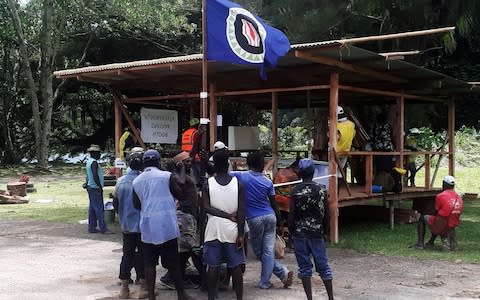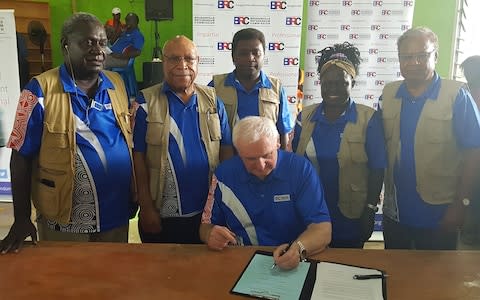Bougainville votes for independence from Papua New Guinea to become world's newest nation

The South Pacific region of Bougainville voted overwhelmingly to become the world's newest nation by gaining independence from Papua New Guinea, results showed on Wednesday.
Bougainville Referendum Commission Chairman Bertie Ahern was cheered when he announced that more than 98 per cent of valid ballots favored independence. The other option in the vote was greater autonomy from Papua New Guinea.
The referendum is nonbinding, and independence will need to be negotiated between leaders from Bougainville and Papua New Guinea. The final say would then go to lawmakers in the Papua New Guinea Parliament. The process of becoming a separate nation could take years to achieve.
Papua New Guinea Prime Minister James Marape's office said he was out of town and was not available for comment.
Around 85 per cent of eligible voters cast more than 181,000 ballots in two weeks of voting.
The referendum is a key part of a 2001 peace agreement that ended a civil war in which at least 15,000 people died in the cluster of islands to the east of the Papua New Guinea mainland.

The violence in Bougainville began in the late 1980s, triggered by conflict over an enormous opencast copper mine at Panguna. The mine was a huge export earner for Papua New Guinea, but many in Bougainville felt they received no benefit and resented the pollution and disruption of their traditional way of living.
The mine has remained shut since the conflict. Some believe it could provide a revenue source for Bougainville should it become independent.
Gianluca Rampolla, the United Nations resident coordinator in Papua New Guinea, congratulated national and provincial governments on the "inclusive and peaceful conduct of the Bougainville Referendum."
"There are ways to go, and like all paths it may be neither smooth nor straight, but the United Nations will continue to be there as the two governments map their future, together," Rampolla said in a statement.

David Sharma, an Australian government lawmaker who once lived in Bougainville as a diplomat and helped draft the 2001 peace agreement, said Australia would keep a close eye on developments in its nearest neighbors.
"I'm pleased that the Bougainvilleans have expressed their view in such a clear way, but I would sound a note of caution that Bougainville is an island of about 200,000 people and countries of that sort of population often struggle to take on all the full attributes of a sovereign state," Sharmer told Australian Broadcasting Corp.
"How this plays out will be a concern. The civil war that started all this in 1988 was initially over a big resource project - the Panguna Copper Mine - but really because of Bougainvillean separatism or independence aspirations at the time, so obviously these issues have sparked serious civil conflict before and unrest, and so I think it is a time we need to tread cautiously and watch closely and do what we can to make sure the situation remains as calm as possible," he added.

